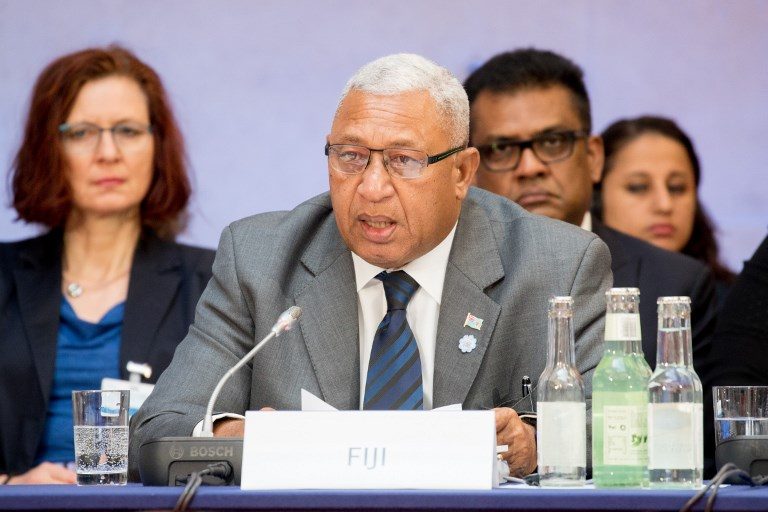SUMMARY
This is AI generated summarization, which may have errors. For context, always refer to the full article.

BERLIN, Germany – At a crucial time in climate diplomacy, the small island-state of Fiji is at the helm, helping steer negotiations for the rule book of the implementation of the Paris Agreement.
Fiji is set to lead the UN Climate Change Conference (COP23) in Bonn, Germany in November, and its Prime Minister, Josaia Voreqe Bainimarama, said the upcoming negotiations will be an “inclusive, participatory, and transparent” one.
COP23, Bainimarama said, aims to bridge the gains made in the Marrakech talks and prepare for the next step in the climate agreement’s implementation guidelines which should be out by COP24 in 2018, set to be hosted by Poland.
To achieve this, the November talks will “ensure that we bring together governments at every level and the people they govern, whether it is the private sector, civil society or ordinary men and women across the world,” the Fijian prime minister said at the opening of the Petersberg Climate Dialogue in Berlin on Monday, May 21.
The “rule book” the Bonn participants started work on is meant to guide countries in implementing the Paris Agreement’s goals – what type of information to include in their emissions-curbing updates, for example.
The rules must be finalized by next year, leaving just over 18 months for what appears set to be a difficult negotiation.
For the COP23, even if Fiji is the president, the conference will be held in Bonn, Germany, for one simple reason: the south Pacific island would not be able to handle the influx of thousands of experts, diplomats, civil society groups, and media who will join the annual meeting.
Official delegations alone are expected to total 30,000 people; the COP23 is expected to draw around 50,000 participants from government, the private sector, the UN, and other sectors.
The Bonn conference, Bainimarama said, will integrate the official, diplomatic negotiations with informal, more public talks, using the Pacific Islands concept of “talanoa” – which means “telling of stories, the transfer of ideas and the conversation between people and the achievement of consensus.”
Uncertainty over US climate policies
The Fijian presidency of the COP23 comes at a time of uncertainty over the climate accord, due to a possible withdrawal of the United States from the agreement.
Under the administration of Donald Trump, the US is currently reviewing its climate policies, and Trump himself has previously said the country – the world’s second largest emitter of carbon dioxide – should leave the agreement.
At the technical negotiations in Bonn earlier this month, the uncertainty over America’s climate policies loomed large, and caused frustration.
“Only by the entire world coming together as one to address the impacts of climate change can we effectively tackle this crisis,” Bainimarama said in Berlin. – with reports from Agence France-Presse / Rappler.com
Add a comment
How does this make you feel?
There are no comments yet. Add your comment to start the conversation.